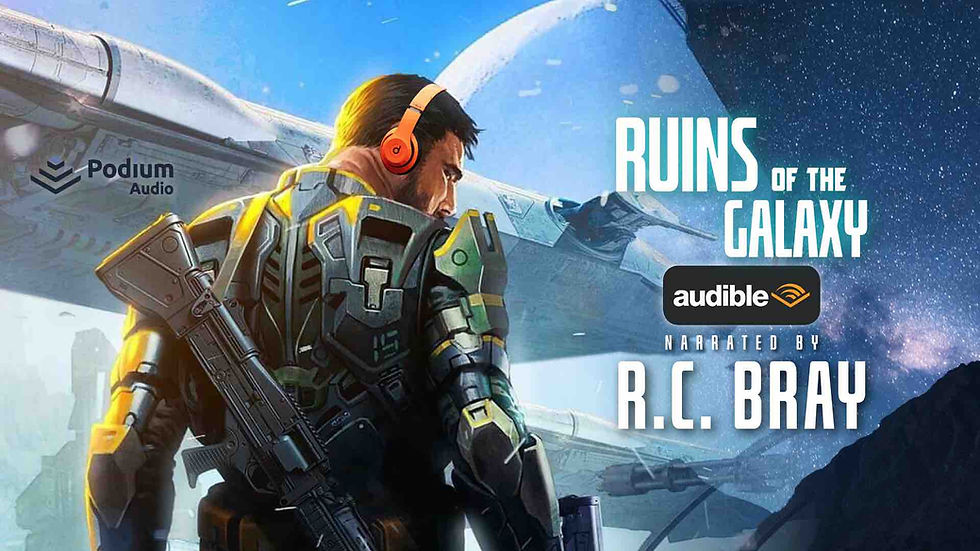The Real Story Behind Ruins of the Galaxy Hitting Audible Today
- Christopher Hopper

- Apr 28, 2020
- 4 min read
I feel like a kid on Christmas Day.
Ruins of the Galaxy Book 1 just dropped on Audible in the wee hours of the morning.
And, yes, I bought my own book so that I could listen to R.C. Bray read it—his performance is that good. But there’s more to it.
Today is one more milestone in what has been a whirlwind sixteen months. A year ago, this week, I had declared bankruptcy, was seeing two counselors for mental health and was working ninety-hour weeks. Writing was a hobby that I dreamed might turn into something much more. But at the time, I had yet to publish Ruins of the Galaxy.
Hope and desperation can be close companions despite their divergent tangents on the emotional spectrum. They can propel us toward achieving remarkable things, but while one resonates with aspirations, the other clangs with reminders of survival. A year ago, I certainly had a mix of both.
I had a sense that my books could be substantial entries into the science fiction genre, and I felt that I was a strong writer. But whether or not my stories would find an audience remained to be seen. That, and I needed to feed my kids and pay a mortgage. Survival is real.
And yet, in the midst of it all, I had hope.
I imagined R.C. Bray reading my novels on Audible, so much so that I could imagine his voice saying my name. Call me crazy, I know.
But crazy is just imagination without perspiration. I, on the other hand, wanted to do the work.
There were few illusions about publishing and what it took—I had experience with both trad pub and indie pub, but always as side hustles. I also knew that I could write fast and maintain good quality. I followed pro tips, grew an alpha reader group, a mailing list, and even asked R.C. Bray for advice on reading my books, seeing as how I couldn’t afford him. (Yes, he wrote back with some tips, which still blows my mind).
After months of diligent research, it dawned on me that leaping into full-time writing was just as risky as any other career change. And, unlike other options, the rewards were far more interesting to me, both in terms of job satisfaction and monetary return.
So I kept putting in ninety-hour weeks, gently asking questions to anyone who would talk to me, and writing as fast and as good as I could. If success is made of many small steps in the right direction, I was determined to make leaps—invite to harsh criticism, burn the candle at both ends, and remain a voracious learner.
I also knew I needed to listen to my greatest encouragers.
The right people will be as honest about your weaknesses as they are about your strengths. We all need that kind of criticism.
For years, I’d wanted to make a living as a professional musician. While music certainly opened incredible doors for me over the last twenty-five years, and it’s still something I love, it never sustained me financially. At times, I even chaffed my lack of commercial success.
Then, as I was entertaining the idea of writing full-time, my wife Jennifer said something to me that I’ll never forget:
“Babe, lots of people can write songs and play guitar. But no one can write the stories that are in your head like you can. You need to write.”
And she was right. The truth was, she’d been saying this to me for over a decade—I was too preoccupied with other pursuits to hear her. Without her gentle but keen insight, I’m not sure I would have let the music career go and pursued writing full-time.
The other lesson I learned was the importance of partnerships. If we are going to do anything well, we need strategic partners. The more significant the work, the more hands are required. If you can enact your dreams all by yourself, then the work probably isn’t that robust (and rarely can sustain you financially).
Even after writing and releasing good novels on my own, I still needed help. Had it not been for people like Jeff Chaney at Variant Publications and Victoria Gerken at Podium Audio partnering with me, you would not hear R.C. Bray read Ruins of the Galaxy today. They and their teams were both essential in partnering with me for success.
“But how do I find partnerships like that?” people often ask me.
The short answer is, you don’t.
Instead, your job is to produce work that is worth being recognized. Not because you scream, shout, and annoy people, but because you keep your head down and out-perform everyone else on your level. That’s when the people above you pay attention and call you up. That’s when you prove to yourself that you have something worth offering to a broad audience.
Imagination, perspiration, and appreciation are three pillars I try to live by—the last being the most beautiful. Learning to appreciate and honor those whose shoulders we stand on is a pursuit worthy of the rest of our lives. God blessed me with a gift to communicate; my wife believes in me like no one else; my business partners work hard to bring our best work to market; and my readers keep me employed. As a result, I will spend the rest of my life being thankful and looking for ways to honor the people who have honored me.
So, when you hear R.C. Bray read our story today, you have a little better glimpse of what’s behind it.
That, and I finally have the headspace to return to music, but in a new role—supporting my wife in her gift, because no one else can write and sing as she can.
Here’s to the pursuit of dreams and the cost to get there.
Cheers,
Christopher




RC Bray is a great narrator for audiobooks - I love everything he does. I just finished Ruins of the Earth series and now started into Ruins of the Galaxy. One question I'm not clear on is if there is supposed to be crossover between the two series. Since the title is similar, I would assume they are different story arcs in the same universe?